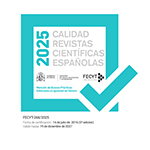Urban popular mobilization through civic festivals and Carnival: Barcelona, 1844-1868
Abstract
During the reign of Elizabeth II, with the exception of the Progressive Biennium stage, the civic festivals disappeared. Later, the renewal of the Carnival turned the festival into a space for popular mobilization in which a group of dissidents from the Elizabethan regime restored a ritual inspired by the civic festivals of the Liberal Revolution. The popularity of the Carnival festival in the first five years of the 1860s must be interpreted in terms of the proliferation of progressive festivals dedicated to San Baldomero and the national holidays of the liberal states. Therefore, the Carnival became a popular civic festival to the extent that its renewal was promoted by a group of republican professionals dedicated to the press, leisure and culture. The success of the renewal of the festival was based on the ability to involve the leisure industry, which saw in the festival the possibility of attracting popular urban sectors to its establishments, and weaving a network of solidarity between recreational and educational societies and cultural. The philanthropic dimension of the festival, heir to the civic festivals, contributed to reinforcing the bonds of solidarity between the popular classes, the professional republican groups and the progressive elites, without awakening the fears of the conservative elites.
Downloads
Article download
License
Aquellos autores/as que tengan publicaciones con esta revista, aceptan los términos siguientes:
a. Los autores/as conservarán sus derechos de autor y garantizarán a la revista el derecho de primera publicación de su obra, el cuál estará simultáneamente sujeto a la Licencia de reconocimiento de Creative Commons Reconocimiento-No comercial-Sin obra derivada 4.0 España que permite a terceros compartir la obra siempre que se indique su autor y su primera publicación esta revista.
b. Los autores/as podrán adoptar otros acuerdos de licencia no exclusiva de distribución de la versión de la obra publicada (p. ej.: depositarla en un archivo telemático institucional o publicarla en un volumen monográfico) siempre que se indique la publicación inicial en esta revista.
Plagio y fraude científico
La publicación de un trabajo que atente contra los derechos de propiedad intelectual será responsabilidad de los autores/as, que serán los que asuman los conflictos que pudieran tener lugar por razones de derechos de autor. Los conflictos más importantes pueden darse por la comisión de plagios y fraudes científicos.
Se entiende por plagio:
1.Presentar el trabajo ajeno como propio.
2.Adoptar palabras o ideas de otros autores sin el debido reconocimiento.
3.No emplear las comillas u otro formato distintivo en una cita literal.
4.Dar información incorrecta sobre la verdadera fuente de una cita.
5.El parafraseo de una fuente sin mencionar la fuente.
6.El parafraseo abusivo, incluso si se menciona la fuente.
Las prácticas constitutivas de fraude científico son las siguientes:
1.Fabricación, falsificación u omisión de datos y plagio.
2.Publicación duplicada.
3.Conflictos de autoría.












